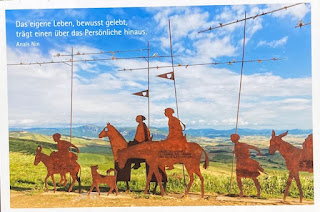I will never forget the Christmas of 1989. I was pregnant with my son, my first-born, and just beginning to show. I was in my fourth month, and was awash with feelings of serenity and awe about the miracle that was happening to me. Although I hadn't yet felt life stirring within, I knew that deep inside my body a new person was growing, and that my wonderful, clever body was supporting him and nourishing him. And that was this was occasion for awe and gratitude.
On the second Sunday of December, I went along to our service at Northampton Unitarians, and broke the news that I was expecting a child. They were all very happy for me. But the icing on the cake came during the service, which was our Christmas service. (Then, as now, we only met on second and fourth Sundays, and that year, the fourth Sunday was after Christmas). One of the readings that lay leader Peter Galbraith had chosen, all unknowing, was the wonderful section early in the Gospel of Luke in which Mary rejoices about being blessed with child. The bit that starts: "My soul magnifies the Lord, and my spirit rejoices in God my Saviour, for he has looked with favour on the lowliness of his handmaiden. Surely, from now on, all generations will called me blessed; for the Mighty One has done great things for me, and holy is his name." I really felt the joy that she must have been feeling. More, I felt exalted, that I was going to participate in the miracle of bringing forth a new life.
Twenty four years later, I still believe that becoming a parent was one of the most important events of my life. Being a parent changed me in fundamental ways - from the moment of my son's birth, there was always someone else to consider, someone else's needs to take into account, and someone else (later two someone elses when my daughter was born) to love and to nurture, and to be overjoyed and frustrated by, in roughly equal measure. Being a parent has been a roller-coaster for me, with wonderful highs and devastating lows, and I would not have missed a day of it.
 |
| image: gograph.com |
At Christmas, we celebrate the birth of one particular child, two thousand years ago, who grew up to have a profound influence in the world, through his teachings and his message and his example. For me, this is the true meaning of Christmas. But today I want to think about the potential for good that is represented by the birth of every child, and also about the inner child that dwells within us all.
Sophia Lyon Fahs wrote: "Each night a child is born is a holy night - a time for singing, a time for wondering, a time for worshipping." Yes. This is something I believe so deeply. It is one of the foundations of my Unitarian faith - that the birth of every child should be an occasion for rejoicing, not just that of Jesus. Every single child born of man and woman has the potential to make a difference in the world, and to leave it a better place than he or she found it.
Perhaps it is our job as Unitarians to provide the space and the community in which individuals can grow to become the best people they can be, giving them the opportunity to "Cherish that of God within you, so that this love may grow in you and guide you," as the Quakers would say. If this is so - and I believe it is - every Unitarian congregation and every Unitarian has an awesome responsibility - to nurture that of God in other people, and in ourselves, so that the world might become a better, kinder, gentler place, in which everyone has enough to eat, a roof over their heads, a place to sleep, and other human basics such as freedom from fear and freedom to grow into their unique and proper selves.
But we cannot do this unless each of us recognises for ourselves that we are "unique, precious, a child of God." My starting point for this blogpost was a beautiful reading called
A Manger of the Heart by the late, and sorely missed, Simon John Barlow, which was published in the Christmas edition of the Cotswold Group Newsletter. The first lines really grabbed my attention: "Prepare the way to welcome your inner child, / The being of love and light / The spark of holiness that lies deep in us all."
And I do believe that there is a spark of holiness within every human being, "that of God in everyone", to use the Quakerly phrase. Our job, here on this earth, today and tomorrow, is to recognise that spark, in ourselves, and in each other. This is the same as Jesus's great injunction to "love your neighbour as yourself." Love your neighbour as yourself - both parts are vital, because it is not possible to truly love your neighbour unless you first love your true self, your inner child, your spark of the divine.
Later on, Simon John advises us to "Commit yourself to nurture your inner holiness / To seek joy wherever it may be found; / To give and receive love every moment of life; / To keep to the paths of beauty, truth and love." These are quite tall orders. We are all human beings, fallible and broken, but I believe that this injunction to committing ourselves to nurture our inner holiness is a path of hope.



















